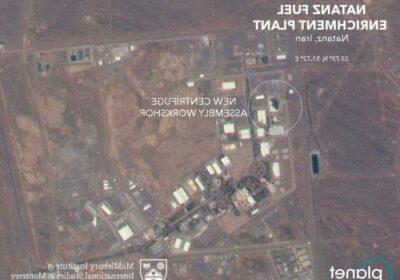Israel 'launches cyber attack' on Iran weapons facility as Tehran declares act of 'nuclear terrorism'

IRAN has accused Israel of “nuclear terrorism” after an audacious cyber attack today on one of its weapons sites.
Following the assault on the Natanz facility, nuclear chief Ali Akbar Salehi the Islamic Republic reserves the right to seek revenge against the perpetrators, state TV reported.
Israel's Kan public radio cited intelligence sources, whose nationality it did not disclose, as saying that the Mossad spy agency had carried out a cyber attack at the site.
Earlier today, the spokesman for Iran's Atomic Energy Organisation (AEOI) had said that a problem with the electrical distribution grid of the Natanz site had caused an incident, local media reported.
Behrouz Kamalvandi, a spokesman for Tehran, said the incident caused no casualties or contamination.
The facility, located in the desert in the central province of Isfahan, is the centrepiece of Iran's uranium enrichment programme and is monitored by inspectors of the International Atomic Energy Agency, the UN nuclear watchdog.
Iran nuke chief Salehi said: “While condemning this despicable move, Iran emphasises the need for the international community and the International Atomic Energy Agency to deal with this nuclear terrorism and reserves the right to take action against the perpetrators.”
Israel, which has accused Iran of seeking to build nuclear weapons that could be used against it, made no official comment on the incident.
This comes a day after Tehran, which has denied it seeks to make atomic weaponary, launched new advanced enrichment centrifuges at Natanz.
Asked about what had occurred, an IAEA spokesman said by email: "We are aware of the media reports. We have no comment at this stage."
Kan Radio, citing the intelligence sources, said the damage at Natanz was more extensive than had been reported in Iran.
At a ceremony today with Israeli military and intelligence chiefs, Prime Minister Benjamin Netanyahu made no direct reference to Natanz.
But he said: "The fight against Iran's nuclearisation … is a massive task".
Tehran says its nuke programme is purely for peaceful purposes.
In July last year, a fire broke out at the facility, which Iran said was an attempt to sabotage the country's nuclear plans.
In 2010, the Stuxnet computer virus, widely believed to have been developed by the United States and Israel, was discovered after it was used to attack Natanz.
The incident at Natanz comes amid efforts by Tehran and Washington to revive Iran's 2015 nuclear deal with major powers after Donald Trump abandoned it three years ago.
Former US President Trump reimposed sanctions that had been lifted on the Islamic Republic under the deal and brought in many more.
In reaction to the sanctions, Iran has gradually breached many restrictions imposed by the accord.
The two nations laid out tough stances at indirect talks in Vienna last week on how to bring both back into full compliance with the deal.
Salehi said: “The action taken against the Natanz site shows the failure of the opposition to Iran's industrial and political progress to prevent the significant development of Iran's nuclear industry.
"To thwart the goals of those who commanded this terrorist act … Iran will continue to improve its nuclear technology on the one hand and to lift oppressive US sanctions on the other hand.”
Iran has blamed Israel for last year's killing of Mohsen Fakhrizadeh, who was seen by Western intelligence services as the mastermind of a covert nuclear weapons programme.
Israel has neither confirmed nor denied responsibility for the killing.
President Hassan Rouhani reiterated Iran's commitment to nuclear non-proliferation on Saturday while overseeing the launch of advanced centrifuges at Natanz to mark the country's National Nuclear Technology Day.
Source: Read Full Article



